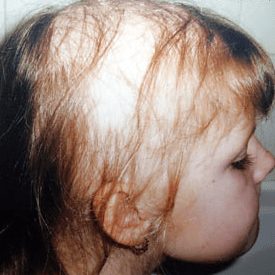Hair Loss Vitamin B12
 Hair Loss Vitamin B12 – Vitamin B12 contains cobalt which is why it is also known as cobalamin. Part of the B complex group, found primarily in dairy produce, eggs and meat. B12 is required for the synthesis of red blood cells, growth and a child’s development, maintaining the nervous system and synthesis of DNA during cell division, which is especially important in regions of rapid cell division such as bone marrow (red blood cell formation). B12 is stored mainly in the Liver (approx 80%) with a total body store of 2-5mgs in an adult. B12 is excreted (from 1-10ug (micrograms) per day) in the bile and reabsorbed.
Hair Loss Vitamin B12 – Vitamin B12 contains cobalt which is why it is also known as cobalamin. Part of the B complex group, found primarily in dairy produce, eggs and meat. B12 is required for the synthesis of red blood cells, growth and a child’s development, maintaining the nervous system and synthesis of DNA during cell division, which is especially important in regions of rapid cell division such as bone marrow (red blood cell formation). B12 is stored mainly in the Liver (approx 80%) with a total body store of 2-5mgs in an adult. B12 is excreted (from 1-10ug (micrograms) per day) in the bile and reabsorbed.
Vitamin B12 deficiency may lead to anaemia as a result of disrupted DNA, leading to the production of mutant cells called megaloblasts.
Symptoms
- Tiredness
- Pallor
- Reduced ability to combat infection
- Being breathless
- Weakness
- Listless
- Tingling of the hands and feet
- Bleeding gums
- Issues with menstrual cycle
- Sore, lower eyelids (lining)
- Pale in appearance
- Irregular heartbeat or palpitations
- Bruising that appears without reason
- Smooth tongue
- Hair loss
- Folic acid (necessary for DNA synthesis) can also be responsible for causing anaemia. Serious case may result in dementia.
In some cases of hair loss vitamin B12, neuropathy causing damage and degeneration of nerve fibres. Nerves themselves are surrounded by insulating fatty sheath which is made up of myelin, a protein. Hair Loss vitamin B12 actively assists in the metabolising these fatty acids which are in essential for maintaining myelin.
B12 issues tend to be from inability to absorb rather than actual deficiency. Absorbing vitamin B12 requires the secretion from the Intrinsic factor which is a glycoprotein produced by the parietal cells in the stomach. The intrinsic factor is absorbed in the small intestine (ileum) with calcium. A blood test should be sought to determine if the problem is dietary or autoimmune. Lifelong injections may be required..
Those on vitamin B12 deficient diets such as vegans and sometimes vegetarians tend to reabsorb more B12 than from their food intake. It can take many years (approx 20) to develop a deficiency disease in those altering their diet to one lacking in B12 due to reabsorbtion however, if failure to absorb leads to B12 deficiency disease occur within a few years (3-4). B12 has very low toxicity and increased levels are not thought to be dangerous.
Where can Vitamin B12 be sourced?
Vitamin B12 should ideally be sourced naturally through your diet as this is the most effective method of consuming it. However this may not be possible due to numerous reasons such as limited foods, cost and dietry requirements.
- Soya products such as miso, tarami, and tempeh have been established to have no significant levels of B12.
- Meats, eggs and dairy produce are reliable sources of unfortified B12. Half a pint of cold milk (full fat or semi) contains approx. 1.2 µg, a slice of cheddar cheese (20g) contains approx 0.25 µg and two boiled eggs contain 1.4 µg.
- Fortified breakfast cereal
- Canned Tuna
- Rainbow Trout
- Clams
- Haddock
- Nutritional fortified yeast
Care should be taken when considering B12 supplements as they may contain B12 analogue which cannot be used to satisfy dietary needs. In fact some research suggests that B12 analogues may compete with B12 leading to the metabolism being inhibited. Although they may contain varying levels of B12 plant sources are not considered a reliable source of B12. Vegans need to make sure they take a good intake of B12.
Contact Us Now
What are you waiting for? Get in touch now and speak to a qualified hair specialist who can help you!
Recommended Intake
Reference nutrient intake (RNI) refers to the level of nutrient adequate for the majority of people (97% approx). The following table represents the RNI for the different age groups. Breast feeding women require 2.0 µg although pregnant women are not believed to require any additional B12.
The minimum level for B12 is around 180 ng/l however most healthy people have a level of around 500ng/l.
|
Age
|
RNI
|
|
0-6 mths
|
0.3µg
|
|
7-12 mths
|
0.4µg
|
|
1-3 yrs
|
0.5µg
|
|
4-6 yrs
|
0.8µg
|
|
7-10 yrs
|
1.0µg
|
|
11-14 yrs
|
1.2µg
|
|
15 plus
|
1.5µg
|
A study conducted by Dr Katherine Tucker a nutritional epidemiologist at the Jean Mayer U.S. Department of Agriculture Human Nutrition Research Center at Tufts University in Boston. The study was to research levels of vitamin B12 in 3000 adults.
Findings – out of the 3000 people tested, 39% presented borderline or slightly deficient, 17% presented low levels and 9% were considered clinically deficient. Interestingly, the status of those in the younger age 26-49yrs group presented similar readings to those over 65 years of age. It was believed by the research team that concentrations of B12 would increase with age.
The deficiencies were as a result of lack of absorption and not to do with lack of B12 in the diet. Hair Loss Vitamin B12 issues need to be investigated. Don’t wait until its too late. Book a consultation now!
Sources:
National Institute of Health – Vitamin B12 deficiency
.
